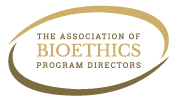This database is a reflection of the nature of a crowdsourcing project. ABPD is not endorsing these individual educational programs.
For more information about Bioethics and Humanities Academic Programs, please visit the ASBH webpage.
For more information about additional master’s and doctoral programs in bioethics, please visit the Hastings Center webpage.
| Question | Answer |
|---|---|
Master’s Degree |
|
| Please indicate the type of degree associated with your educational program: | Master of Science (MS) |
| Educational program name: | The Bioethics Program of Clarkson University and the Icahn School of Medicine at Mount Sinai |
| What institution administers your educational program? | Clarkson University |
| What bioethics program, department, or division administers your educational program? | Department of Bioethics |
| City: | Schenectady |
| State/Province: | New York |
| Country: | United States |
| Year first class matriculated: | 2003 |
| Educational program website: | http://bioethics.clarkson.edu |
| Does the educational program have a designated faculty program director? | Yes |
| Program Directors Name | Sean Philpott-Jones |
| Program Directors Title | Program Director and Department Chair |
| Program Directors Email | sphilpot@clarkson.edu |
| Program Directors Phone | 518 631 9863 |
| Does the educational program have a designated staff program administrator? | Yes |
| Program Administrators Name | Ann Nolte |
| Program Administrators Title | |
| Program Administrators Email | anolte@clarkson.edu |
| Program Administrators Phone | 518 631 9860 |
| What are the educational program’s admission requirements? | Degree(s) Transcript(s) Letters of recommendation Statement of interest |
| Degree(s) | Bachelor’s degree |
| Number of letters of recommendation: | 3 |
| Is the educational program offered with a dual degree? | Yes |
| In conjunction with what other degree(s) is the educational program offered? | JD Albany Law School MSW SUNY Albany School of Social Work MPH SUNY Albany School of Public Health PhD SUNY Albany Department of Philosophy |
| What is the minimum length of time to complete the full-time educational program? | 12 |
| What is the minimum length of time to complete the part-time educational program? | 24 |
| What is the typical length of time to complete the full-time educational program? | 15 |
| What is the typical length of time to complete the part-time educational program? | 36 |
| Is the educational program offered online or in-person? | Hybrid (online and in-person are both required) |
| What is the educational program’s average annual new trainee enrollment size? (Average over the last two years) | |
| What is the cost per credit? | 935 |
| What is the educational program’s total tuition and fees? | 33660 |
| More information on tuition: | |
| Does the educational program offer tuition scholarships? | Yes |
| Please describe what types of scholarships are available: | Merit and Need |
| Does the educational program offer an annual stipend for trainees? | No |
| What is the stipend per trainee? | |
| What, if any, specific tracks/specializations are offered as part of the educational program? | Clinical Ethics, Research Ethics, Bioethics Policy |
| How many credit hours are required to graduate? | 36 |
| How many courses are required to graduate? | 12 |
| Required course | Proseminar in Health and Human Values Biomedical Ethics Healthcare Policy Bioethics and the Law Online Practicum Onsite Practicum Capstone Master’s Project 1 Master’s Project 2 |
| Elective | Clinical Ethics Research Ethics Advanced Research Ethics Foundations of Bioethics Policy Medicine and Social Justice Public Health Ethics Reproductive Ethics Ethics at the End of Life Neuroethics Pediatric Ethics Empirical Research Methods Contemporary Issues in Bioethics |
| Is there a clinical component associated with the educational program? | Yes |
| Does the educational program provide training in clinical ethics consultation? | Yes |
| On average, how many clinical ethics consultations do your trainees participate in as an observer? | 3 |
| On average, how many formal clinical ethics consultations do your trainees lead? (i.e., interact with the provider/patient/surrogate and write the chart note)? | 2 |
| Do all of your trainees lead a minimum of 30 clinical ethics consultations (i.e., interact with the provider/patient/ surrogate and write the chart note)? | No |
| Is the training in clinical ethics consultation grounded in the ASBH Core Competencies? | Yes |
| Are trainees periodically assessed and evaluated for meeting the skills and knowledge necessary to carry out clinical ethics consultations in accord with the ASBH Core Competencies? | Yes |
| How are trainees evaluated? | Mock scenarios using trained actors in a controlled and observed environment, other written and oral assessments. |
| Do trainees complete an oral exam offered by a panel of three clinical ethics fellowship program directors? | No |
| Are graduates purported by the educational program to be competent to conduct independent clinical ethics consultations? | No |
| Does the educational program require any of the following to graduate? | Thesis Comprehensive exam |
| Do graduates receive a certificate or diploma upon successful completion? | Yes |
